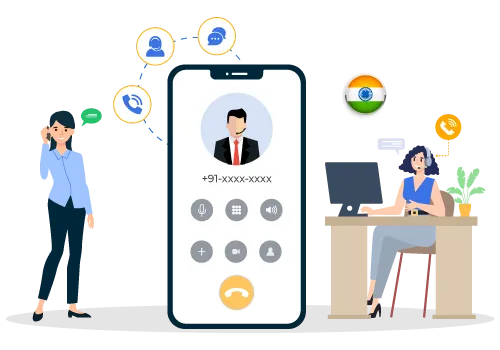Introduction
Virtual phone number, also known as cloud phone numbers or VoIP (Voice over Internet Protocol) numbers, operate through the internet rather than traditional phone lines. They offer flexibility, cost-effectiveness, and a wide range of features, making them an attractive option for modern communication needs. The virtual phone number provider India offers flexible communication solutions for businesses and individuals.
Define the Concept
A virtual phone number is essentially a phone number that is not directly tied to a specific phone line. Instead, it is hosted in the cloud, allowing users to make and receive calls from any internet-enabled device.
Relevance and Importance
In a globalized world where remote work and international business are increasingly common, virtual phone numbers provide a scalable and efficient communication solution. They enable businesses to establish a local presence in multiple geographic locations without the need for physical offices.
How Does It Work?
Technical Infrastructure
Virtual phone numbers rely on VoIP technology to transmit voice data over the internet. When a call is made to a virtual number, the signal is converted into digital packets and routed through the internet to reach its destination.
Call Routing
One of the key features of virtual phone numbers is call routing. Calls can be forwarded to any designated phone number, such as a mobile phone or landline, based on predefined rules or conditions.
Web Interface
Users typically manage their virtual phone numbers through a web-based interface or mobile app. This interface allows them to configure settings, view call logs, and access additional features like voicemail and call recording.
Types and Categories
Local Numbers
Local virtual phone numbers are assigned specific area codes, allowing businesses to establish a presence in a particular geographic region. This can enhance credibility and accessibility for local customers.
Toll-Free Numbers
Toll-free virtual numbers, such as those with prefixes like 800, 888, or 877, enable callers to reach businesses without incurring any charges. These numbers are often used for customer support or sales hotlines.
Vanity Numbers
Vanity virtual phone numbers feature custom sequences of digits that spell out words or phrases, making them easy to remember. This can help businesses reinforce their brand identity and attract customer attention.
Benefits
Cost Savings
Virtual phone numbers typically involve lower setup and operational costs compared to traditional phone lines. There are no hardware requirements, and calls are transmitted over the internet, reducing long-distance charges.
Flexibility and Mobility
With virtual phone numbers, users can make and receive calls from any location with internet access. This flexibility is particularly advantageous for remote workers, traveling professionals, and distributed teams.
Scalability
Virtual phone systems are highly scalable, allowing businesses to add or remove lines as needed without significant infrastructure changes. This scalability makes them suitable for startups, growing enterprises, and seasonal businesses.
Challenges and Limitations
Internet Dependence
Since virtual phone numbers rely on internet connectivity, they may be susceptible to disruptions or quality issues if the internet connection is unstable or slow.
Security Concerns
While virtual phone systems offer encryption and security features, they may still be vulnerable to hacking or unauthorized access, especially if proper security measures are not implemented.
Regulatory Compliance
Depending on the jurisdiction and industry, businesses may need to comply with specific regulations regarding the use of virtual phone numbers, such as data protection and telecommunications laws.
Latest Innovations
Integration with CRM
Many virtual phone systems now offer integration with Customer Relationship Management (CRM) software, allowing businesses to streamline communication and track interactions with customers.
Artificial Intelligence
Some virtual phone providers leverage Artificial Intelligence (AI) technology to enhance call routing, analyze customer conversations, and automate certain tasks, such as appointment scheduling.
Future Prospects
Enhanced Features
As technology continues to advance, virtual phone systems are expected to offer increasingly sophisticated features, such as real-time transcription, language translation, and predictive analytics.
Global Expansion
With the proliferation of internet connectivity worldwide, virtual phone numbers are likely to play a significant role in facilitating global communication and enabling businesses to expand their reach across borders.
Conclusion
In conclusion, virtual phone numbers represent a modern and versatile communication solution that offers numerous benefits for individuals and businesses alike. By leveraging internet technology, these numbers provide cost savings, flexibility, and scalability, while also introducing innovative features for enhanced productivity and customer engagement.
About Us:
“Space Edge Technology” appears to be a term that might refer to a company, concept, or technology related to space exploration or utilization. However, without further context, it’s challenging to provide specific information.

